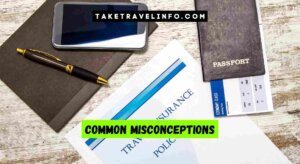Not true: the DOD travel policy does not cover personal travel expenses or non-reimbursable expenses. The Department of Defense (DOD) has established a travel policy that governs the reimbursement of official travel expenses for military personnel and employees.
This policy aims to ensure that all travel expenses incurred during official duty are properly accounted for and reimbursed. However, there are certain misconceptions about the DOD travel policy, and it is important to understand what is not true. One common misunderstanding is that the policy covers personal travel expenses or non-reimbursable expenses.
This is incorrect, as the DOD travel policy only covers expenses directly related to official duty travel. In this article, we will debunk this misconception and provide a clear understanding of what the policy does and does not cover.
Common Misconceptions

Misconception 1: Excessive Per Diem Rates
There is a common misconception that the Department of Defense (DOD) travel policy allows for excessive per diem rates. However, this is not true. The DOD travel policy strictly adheres to the general services administration (gsa) per diem rates, which are based on the location and time of travel.
These rates are designed to cover a traveler’s lodging, meals, and incidental expenses while on official duty. It is important to note that these rates are not meant to be extravagant or excessive, but rather to provide a reasonable allowance for the traveler’s expenses.
- Gsa per diem rates are determined based on extensive research and analysis of market costs in each specific location.
- The rates are periodically updated to reflect changes in the cost of living and other relevant factors.
- The DOD travel policy emphasizes responsible spending and discourages excessive or unnecessary expenses.
Misconception 2: Limited Reimbursement Options
One common misconception about the DOD travel policy is that it offers limited reimbursement options for travelers. However, this is not true. The policy provides various reimbursement options to ensure that travelers are fairly compensated for their expenses.
- Travelers can submit their expenses for reimbursement through the defense travel system (dts), which offers a user-friendly interface and streamlined process.
- The policy allows for reimbursement of reasonable and necessary expenses incurred during official travel, including transportation, lodging, meals, and incidentals.
- Travelers can choose from different reimbursement methods, such as direct deposit or government travel card payment.
Misconception 3: Strict Travel Authorization Process
Another misconception is that the DOD travel policy has a strict travel authorization process that makes it difficult for travelers to obtain necessary approvals. However, this is not true. While there are certain requirements and procedures in place to ensure responsible travel, the authorization process is designed to be efficient and user-friendly.
- The DOD travel policy encourages travelers to obtain travel authorizations well in advance to allow for proper planning and budgeting.
- The travel authorization process is tailored to the needs of the individual traveler, taking into account factors such as destination, purpose of travel, and duration.
- The online authorization system, available through the defense travel system, simplifies the process and allows for quick approvals.
Understanding the truth behind these common misconceptions is essential for any traveler under the DOD travel policy. Per diem rates are not excessive, but rather based on GSA rates. Reimbursement options are not limited, and the travel authorization process is not overly strict.
By familiarizing ourselves with the actual policies and procedures, we can ensure smooth and compliant travel experiences.
Debunking The Myths

Navigating the DOD travel policy can be overwhelming, especially with the plethora of misinformation surrounding it. In this section, we will debunk some common myths surrounding the DOD travel policy to help you separate fact from fiction.
Let’s dive in and expose the truth about per diem rates, understand per diem allowances, clarify reimbursement options, and simplify the travel authorization process.
Exposing The Truth About Per Diem Rates
- Per diem, rates are not fixed and are unchangeable for all destinations. They vary depending on the location and duration of your travel. It is important to familiarize yourself with the rates specific to your travel destination.
- Per diem, rates are not solely determined by the defense travel management office (demo). They are established by the general services administration (gsa) and are subject to regular updates and adjustments.
- The per diem rates do not represent the maximum amount that travelers can spend. They are designed to cover reasonable lodging, meal, and incidental expenses. If your actual expenses exceed the per diem rates, you may be required to provide additional documentation for reimbursement.
Factors Affecting Per Diem Rates
Several factors can influence the per diem rates, including:
- Seasonal variations: Rates may differ based on peak and off-peak travel seasons in certain locations.
- Cost of living: Per diem rates are often adjusted to reflect the local cost of living in a particular area.
- Lodging availability: Rates may be higher in areas with limited lodging options or during high-demand periods.
- Local taxes: Per diem rates may be impacted by applicable local taxes, which can vary from location to location.
Understanding Per Diem Allowances
- Per diem, allowances are meant to cover lodging, meals, and incidental expenses incurred during official travel. They are intended to simplify the reimbursement process by providing travelers with a daily allowance instead of expecting them to submit individual receipts for every expense.
- Per diem, allowances are not automatically provided for personal travel or non-official activities during official travel. If you plan to extend your stay or engage in personal activities, you may need to cover those expenses out of your pocket.
- Per diem, allowances are typically prorated for partial travel days. The amount will be adjusted based on the duration of your travel.
Dispelling The High Per Diem Rate Misconception
- While per diem rates are designed to cover reasonable expenses, they do not mean that travelers should aim to spend the entire allowance each day. You are not obliged to spend the entire amount if your actual expenses are lower.
- Reimbursements will be provided based on actual expenses incurred, as long as they are within the authorized per diem rates. It is essential to keep accurate records and receipts to support your expense claims.
- Per diem rates should not be seen as an opportunity to incur unnecessary expenses. Travelers are expected to exercise cost-consciousness and make reasonable choices when it comes to meals and lodging.
Clarifying Reimbursement Options
- Reimbursement options are not limited to per diem allowances alone. In specific cases, you may be eligible for reimbursement of actual and necessary expenses. This could include expenses such as conference registration fees, ground transportation, and other eligible costs.
- Reimbursement for certain expenses may require additional documentation or justification. Familiarize yourself with the specific requirements and guidelines to ensure a smooth reimbursement process.
Types Of Allowable Expenses
The DOD travel policy allows for reimbursement of various types of allowable expenses, including:
- Transportation expenses: This includes airfare, train fare, rental car expenses, parking fees, and tolls.
- Lodging expenses: Reimbursable lodging expenses may include the cost of a hotel room, guest house, or other authorized accommodations. Ensure that your lodging expenses are within the authorized per diem rates.
- Meal expenses: Reasonable meal expenses incurred during official travel are eligible for reimbursement. Remember to adhere to the specific meal and incidental expense (m&ie) rates applicable to your destination.
Eligible Transportation Expenses

When it comes to transportation expenses, it is important to note the following:
- Airfare should be booked at the most economical rate available. Travelers are advised to make use of government-contracted airlines whenever possible. However, if no government-contracted airlines are servicing the route or the travel is urgent, you may be eligible for a waiver.
- Ground transportation costs, such as taxis or rideshare services, can be reimbursed when they are necessary for official travel. Keep in mind that only actual and reasonable expenses will be eligible for reimbursement.
Reimbursable Lodging Expenses
- The DOD travel policy allows for reimbursement of lodging expenses at rates determined by the GSA. The rates take into account the average cost of lodging in each destination and aim to offer reasonable and suitable accommodations.
- If the lodging expenses exceed the authorized per diem rates, you may be required to cover the difference out of your pocket. Conversely, if your actual expenses are lower, you will be reimbursed at the actual amount.
Simplifying The Travel Authorization Process
- The travel authorization process has been simplified with the introduction of the defense travel system (DTS). DTS provides an efficient and streamlined platform for planning and approving official travel.
The Role Of The Defense Travel System
- The defense travel system (dts) serves as the central hub for managing and processing official travel authorizations, travel reservations, and expense reimbursements. It helps automate and streamline the travel process, reducing administrative burden and ensuring compliance with DOD travel policy.
Common Myths About Travel Authorization
- One common myth is that travel authorization is not required for short trips or low-cost travel. However, it is crucial to obtain proper authorization for all official travel, regardless of the duration or cost.
- Another misconception is that approval for travel authorization is automatically granted. In reality, proper review and approval are required to ensure compliance with regulations and budgetary constraints.
Streamlining The Approval Workflow
- The defense travel system (dts) simplifies the approval workflow by providing a centralized platform for all travel-related requests. It allows for efficient routing and approval processes, saving time and reducing delays.
With these myths debunked, you can now navigate the DOD travel policy with greater clarity and confidence. Understanding the truth about per diem rates, per diem allowances, reimbursement options, and the travel authorization process will help you make informed decisions and ensure compliance with the dod guidelines.
Take advantage of the defense travel system (dts) to simplify and streamline your travel experience. Get ready to embark on your official journeys with ease!
Benefits Of DOD Travel Policy

As a member of the Department of Defense (DOD), you may be familiar with the travel policy that governs your official trips. The DOD travel policy offers numerous benefits to ensure cost savings, fiscal responsibility, and overall effectiveness. Let’s explore the advantages in detail:
Cost Savings And Fiscal Responsibility
- Reduction in travel costs through standardized rates and negotiation with travel vendors.
- Any savings generated can be redirected toward other essential areas within the DOD budget.
Effective Financial Planning
- Clear guidelines for budgeting and forecasting travel expenses.
- Facilitates efficient allocation of resources by ensuring funds are utilized optimally.
Minimizing Unauthorized Expenses
- Strict regulations and oversight to prevent unnecessary spending or misuse of funds.
- Controls are in place to identify and mitigate potential risks related to unauthorized expenses.
Promoting Compliance And Accountability
- Compliance with federal regulations and policies to maintain transparency and accountability.
- Regular audits and reporting mechanisms to monitor adherence to travel policies.
Improved Travel Experience
- Access to travel benefits such as discounted rates for flights, accommodations, and car rentals.
- Streamlined processes for booking and managing travel arrangements efficiently.
Enhanced Safety And Security Measures
- Comprehensive safety protocols to safeguard travelers and their belongings during the trip.
- Awareness programs and training to mitigate potential security threats.
Access To Convenient Travel Tools And Resources
- Online platforms and resources to assist in travel planning, including itinerary management and travel support.
- Real-time updates on travel advisories and alerts for a hassle-free journey.
Streamlined Claims And Reimbursement Process
- Simplified procedures for submitting travel claims and requesting reimbursement.
- Timely processing and reimbursement of expenses incurred during official travel.
Support For Mission Readiness
- Ensures personnel can travel swiftly and efficiently to fulfill their duties.
- Minimizes disruptions to mission preparations and operations.
Facilitating Efficient Mission Planning
- Clear guidelines for travel planning and coordination to optimize mission success.
- Standardized processes for managing travel logistics, including transportation and accommodation arrangements.
Ensuring Timely Arrival And Departure
- Prompt scheduling and organization of travel arrangements to ensure smooth arrivals and departures.
- Avoids unnecessary delays and disruptions that can impact mission timelines.
Collaboration And Coordination Across Units
- Facilitates seamless communication and coordination among different units involved in travel planning.
- Enhances teamwork and cooperation to achieve efficient travel logistics.
The DOD travel policy offers a wide range of benefits, including cost savings, enhanced safety measures, convenient travel tools, and streamlined processes. By adhering to the policy, you contribute to the overall effectiveness and efficiency of dod operations.
Frequently Asked Questions Of What Is Not True About DOD Travel Policy
Can Military Spouses Travel On Their Own Using The DOD Travel Policy?
No, the DOD travel policy only applies to official travel conducted by military members and civilian employees.
What Expenses Are Covered Under The DOD Travel Policy?
The DOD travel policy covers expenses such as transportation, lodging, meals, and incidentals directly related to official travel.
Are There Any Restrictions On The Use Of Personal Credit Cards For Travel Expenses?
Yes, personal credit cards can be used for travel expenses, but it is important to follow reimbursement procedures to ensure timely repayment.
Can Military Members Receive Reimbursement For Travel Expenses In Advance?
In some cases, military members may be eligible for a travel advance for expenses such as lodging and meals, but it requires proper documentation and approval.
Is It Necessary To Obtain Travel Authorization Before Embarking On Official Travel?
Yes, travel authorization is a crucial step that ensures the travel is approved by the appropriate authorities and enables reimbursement for expenses.
What Happens If The Travel Expenses Exceed The Authorized Amount?
If travel expenses exceed the authorized amount, it is the responsibility of the traveler to cover the excess cost out of their pocket.
Conclusion
To sum it up, it is crucial to debunk the misconceptions surrounding the DOD travel policy. Contrary to popular belief, several things are not true about this policy. Firstly, the notion that all DOD personnel have unlimited travel privileges is incorrect.
The policy strictly outlines the eligibility criteria and specific circumstances for travel. Secondly, the assumption that all travel expenses will be covered by the government is false. DOD personnel are responsible for certain costs, and it is important to be aware of these before embarking on any travel plans.
Lastly, the misconception that travel restrictions do not apply to DOD personnel is far from reality. Like any other government policy, there are guidelines and restrictions to ensure the safety and security of personnel. By clarifying these misconceptions, we can have a more accurate understanding of the DOD travel policy.
So, before making any assumptions, it is essential to refer to official sources and properly educate ourselves on the matter.

